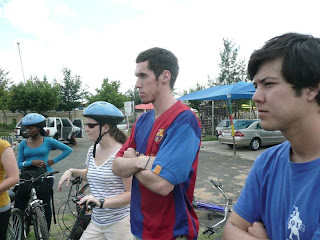Cultural Lesson #4:
People from Botswana are called Batswana. Here they pronounce Botswana more like Boh-TSWA-nah and Batswana more like we pronounce Botswana (Bah-TSWA-nah). I still slip up once in a while and refer to them as Botswanans, but, like my other American habits, that is slowly fading. The language and culture are referred to as Setswana (or just Tswana for short), as in ‘Setswana culture is prevalent among the Batswana.’
So I just got back in town from a weekend trip to Johannesburg (Jo-burg), which was a blast. We headed out right after class on Friday and piled 26 people into a 27-person bus, which in the states would have been for 20 people, maximum. The seats were wide enough for about three-quarters of a person, and the back row of five people had to alternate people leaning forward and back, because five pairs of shoulders literally wouldn’t fit in the width of the bus.
 |
| The bus put everyone to sleep |
The ride was a little bit longer than expected, and we missed our tour of the Origins Museum in Jo-burg, but I don’t think it was too sorely missed because everyone was hungry and looking to relax after the five-hour ride. We stayed at a backpackers in Soweto, which is a township of Jo-burg (but still has its own population of 4.5 million!). The backpackers turned out to be a fantastic find. All of the staff members were eager to help and make you feel at home and the place had a great atmosphere. In the back they had set up a tropical oasis with palm trees, hammocks, bamboo huts and lofts, a sand floor, reggae music and even a Rainbow Lorikeet (a small, rainbow-colored parrot). They served a hearty dinner and we got to enjoy the tropical setting all night.
 |
| Backpackers oasis |
They had darts, pool, foosball and a fire pit. One of the local guys and I played darts for most of the night, and all around kids were laughing and smiling as we enjoyed a beautiful night in Jo-burg.
 |
| Foosball, darts, bamboo hut |
 |
| Tour guide introducing the sour milk |
 |
| Derek trying the traditional sorghum beer |
 |
| Robin, Derek and I with the half-finished housing complex in the background |
 |
| One of the tour guides explaining the history of the student revolt in 1976. Behind him is the iconic photo of Hector Peterson being carried after he was shot. |
 |
| Giving our full attention. From left to right, Senani, Molly, myself and Derek |
 |
| "Bunny chow" |
 |
| Tour stop at one of Mandela's houses. Who's that stud in the #4 jersey? |
We got back to the backpackers shortly after and the sun and the biking had taken its toll. It was four in the afternoon and the place was a ghost town because everyone had fallen asleep. I was on the couches with a group of people and we had sat down to watch a soccer match, but two minutes into it we were all dead asleep. Derek was curled up next to the bus driver, Robin was curled up next to one of the local students, and another boy and I had tipped straight back.
As people peeled themselves from beds and hammocks and couches, dinner was ready and we spent another night with good food in the pseudo-tropical jungle. A group of us stayed up late playing cards (a couple of people had heard of 500 but we stuck to simpler games) and telling stories around the fire. I could get used to these kinds of weekends.
Steak and corn-on-the-cob on the grill with pop (a white, sticky maize meal) and a pepper-bean salad all lathered with hot sauce and washed down with peach juice for dinner…
p.s. On the way down to Jo-burg I asked if anyone had heard the song “Johannesburg” by Gil Scott-Heron. People looked at me like I was crazy, so I thought I’d share the song with you below. Gil Scott-Heron is a singer and spoken word artist from the 70’s and 80’s whose songs and poems were laced with political and social commentary. He is considered one of, if not the, father of modern hop-hop and he’s one of my heroes because my all-time favorite artists (like Talib Kweli, Common, Kanye) all cite him as a major influence and sample his tracks all throughout their work.
"Johannesburg" refers to the struggle of the black people in South Africa during apartheid. If you listen close to the lyrics, Scott-Heron touches on a lot of the key social aspects of apartheid. The chorus ("Have you heard from Johannesburg?") highlights the tight hold the South African apartheid government had on the media and the small amounts of news that actually reached the U.S. regarding the oppression of blacks.



Hi Mike! It sounds like you had another memorable weekend. Bet you wished, though, that you and your friends had prepared the meal for today. The meal didn't sound very mouth watering. Have a good week ahead. Kathy and Rich
ReplyDeleteHi again, Mike! I meant to mention the pictures you posted in my last comment. Great pictures and so good to see you in them too! You are looking great. Now I can also put the names with the faces for your new friends, Derek and Robin.
ReplyDeleteTake care of yourself and love always, Kathy